Aliya Whiteley's Blog, page 12
March 18, 2021
Acknowledging the inn is out
It was published in the US on Tuesday, and it’s available in the UK today – yes, Skyward Inn is out there…
I completely forgot to thank anybody in the back of the book, for which I really apologise. So here goes – the blog version:
A huge thank you to David Moore, Hanna Waigh, and everyone at Solaris Books for doing such a magnificent job of putting the book in print and getting it out to the world. Thanks to Dominic Forbes for the wonderful cover, and Kristin Atherton for reading the audiobook version beautifully.
Thank you times a thousand, Max Edwards. There wouldn’t be a book I can hold in my hands without you. Thanks to George Sandison, Tim Stretton, Nina Allan and Nick Porecki for reading early drafts and keeping me going with coffee and wine, patience, good grace and good conversation. And, of course, a great big thanks to my brother Jim, my parents, and to Nick, Elsa and Barney. I couldn’t have had better company to be alone with.
*
There have been some wonderful reviews so can I also say thank you to everyone who has reviewed it, or read it, so far? I’m extremely grateful for your time and energy. And that’s it! The inn is out.
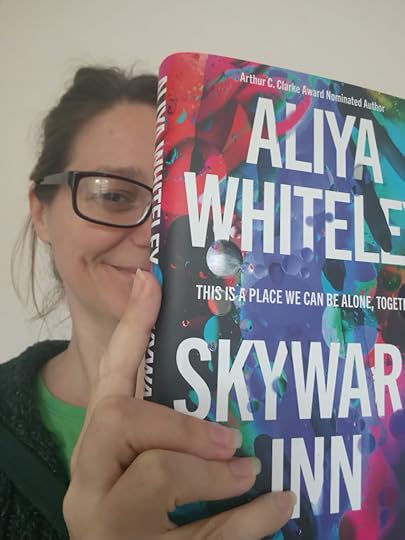 This looks okay… maybe I’ll give the first chapter a go…
This looks okay… maybe I’ll give the first chapter a go…
March 12, 2021
Backing Into the Light
An anthology from Unsung Stories is always good news, and this one feels very timely. You can back ‘Out of the Darkness’ on Kickstarter. Lots of people already have, which is very good news. I’m really pleased to have written a story for this, along with some amazing writers, and here are the details:
Out of the Darkness challenges some of the most exciting voices in horror and dark fantasy to bring their worst fears out into the light. From the black dog of depression to acute anxiety and schizophrenia, these stories prove what fans of horror fiction have long known – that we must understand our demons to overcome them.
In the wake of the Covid-19 pandemic, what began as a mental health crisis has rapidly become an unprecedented tsunami. The Centre for Mental Health has estimated that 10 million people will need mental health support in the UK as a direct consequence of Covid-19, with a staggering 1.5 million of those being under eighteen.
Edited by Dan Coxon (This Dreaming Isle) and featuring exclusive stories by Alison Moore, Jenn Ashworth, Tim Major and Aliya Whiteley, this collection harnesses the power of fiction to explore and explain the darkest moments in our lives.
Horror isn’t just about the chills – it’s also about the healing that comes after.
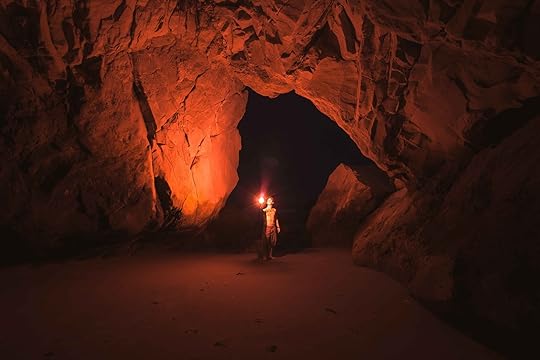 Photo by Jeremy Bishop on Pexels.com
Photo by Jeremy Bishop on Pexels.com
March 4, 2021
Divide and Communicate
Not long to go until Skyward Inn is out in the world, and I’m at that point where I can’t quite sit still for thinking about it. I signed some copies for Goldsboro Books a few days ago, and I’ve been busy chatting about it and trying to make sense of what it’s about so I can answer that question when people ask me.
I’m pretty certain it’s about the divisions between people (and aliens) so I wrote an article for Tor about five of my favourite books that have used that theme in different ways. Here’s an extract:
Often books that achieve this feel deeply truthful about what it means to be human. Personality is, perhaps, a collection of memories, thoughts and feelings, joined together with the cracks papered over in reality. In fiction, these cracks can be exposed. They can even be blasted apart.
You can read the whole article here.
And – save the date! I’ll be in conversation with MR Carey and Brian Nisbet as a Glasgow2024 event on the evening of Monday March 29th:
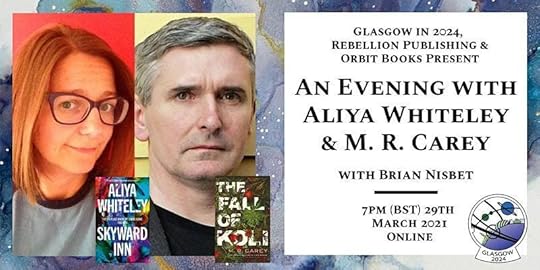
It’s going to be fun. And probably a bit fungal, at times. I think you need to book a ticket fairly quick-smartish, if you’re interested, as they’re going fast. Hope to see you there. Well, you know what I mean.
February 26, 2021
Six books, small words, big meanings
I’m still popping up in a few places to promote The Loosening Skin, and over the past few days I’ve been very happy to answer questions for the excellent websites Nerds of a Feather and Horror Tree. Here’s a bit from both:
What book are you currently reading?
I’m nearing the end of Emmanuel Carrère’s biography of Philip K. Dick. It’s called I Am Alive and You Are Dead, and at times it’s really playful with style, throwing in questions and puzzles, breaking up sections at odd points to ruminate on inspiration and religion. The author often sinks himself into what he imagines Dick would have felt as he wrote his novels, which makes me feel both intrigued and uncomfortable. How could you possibly have come up with that? I find myself asking of both the biographer and the subject – and: Who’s in control here? Both of which strike me as very pertinent questions to be asking when it comes to the life of Philip K. Dick.
You can read the rest of the Nerds of a Feather interview, Six Books, here.
***
“I’m a bit obsessed with these small words that can mean so many things,” Whiteley says. “Love. Change. Fear. Time. And Weird! I think I know what they mean to me, but I’ve got no way of communicating that perfectly, so there’s always some doubt remaining. For instance, when people say, ‘We’re in love,’ does it matter if that love is not the same between them? That element of doubt, of wondering how to be sure of what I feel or what others feel, is also a driving force. So, I could say that all my novels are really about the difficulty of achieving real communication.”
The rest of the Horror Tree interview can be found here.
 Photo by Fiona Art on Pexels.com
Photo by Fiona Art on Pexels.com
February 24, 2021
Release the Titans
The Loosening Skin (US/Canada edition) is out there! I’ve seen some great pictures of it in bookshops and on TBR piles, but my favourite picture of it comes from a blog post by Titan Books. Here it is in a line-up with my other Titan titles:
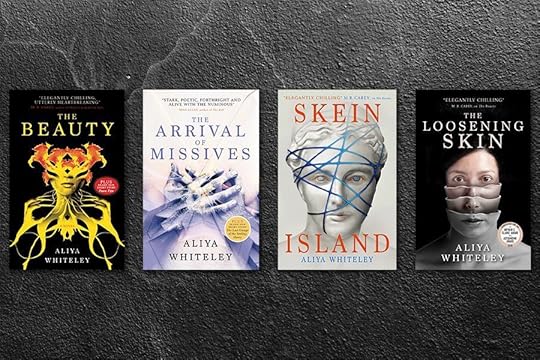
By the end of this year, the short story collection From the Neck Up will make this a collection of five with matching covers, and that is just amazing to me – one of those things I never thought I’d get lucky enough as a writer to have. We’re putting the finishing touches to From the Neck Up now, and I’ve tried to make it a collection of my favourite short stories over the past ten years, along with a few new ones.
Meanwhile, spare a thought for Paul Semel, who has now interviewed me a number of times, and is beginning to show signs of fatigue. Sorry, Paul. I’m taking a writing break at the moment, I promise you. Here’s an extract:
Are there stories — either written or in movies or TV shows — that had a big influence on The Loosening Skin? And I mean just on this story, not on your style as a whole.
Following on from the answer above, a lot of those black and white crime thrillers featuring Robert Mitchum or Humphrey Bogart, were hanging around in my mind. The twistiness of those plots, and the loneliness of the leads. They were so disaffected, iconic. I haven’t really explored that before, but I love those films. I’d say Out Of The Past is my favorite. It’s definitely an influence just on this book.
February 22, 2021
Places to find horror
I’ve been busy talking about flies, loneliness, aliens, ghosts, and flaying, in order to promote the publications of both The Loosening Skin (US) and Skyward Inn (UK & US).
Over at Breaking the Glass Slipper, we chatted about loneliness as a driving force of science fiction, including Star Wars, Star Trek, Graham Greene, and lots of other things. Thanks so much to the BtGS lot for having me back (I was first there to talk about the UK release of Skin, a couple of years ago) – it’s always a good conversation with them.
At Horror Tree, I got a chance to recreate a scene from Poltergeist, and then explain why skin can be scary:
Skin is the largest organ of the body. You’re probably carrying about eight pounds of it. It insulates, protects, and regulates. Human skin regenerates its layers from birth to death, and is thickest on the soles of the feet. I was very young when I found out that some creatures shed their skins, leaving them behind, rather than endlessly renewing them. Playing in the dunes above the local beach, I found the intact skin of a small snake, an adder, so delicate, the diamond pattern still visible.
Thanks to Horror Tree for hosting me as part of Women in Horror month.
February 12, 2021
Avalon and other places
With the US release of The Loosening Skin, and the publication of Skyward Inn, both coming up in the next couple of months, I’ll be popping up virtually in a few more places, talking about writing and inspiration and things I love. I’ll blog about them as I go along, and to start there’s a Q&A about body horror, awards and shaggy ink caps up at Fangirlnation. Here’s an excerpt:
Q: You have become a master of literary style body horror. Do you have any particular inspirations?
A:I’m interested in how we trust our bodies, or learn to distrust them through experience, and I’ve found that exaggerating or swapping around some aspects of how our bodies behave is a good way of exploring that. I’m not trying to create horror in the sense of finding something that a reader should fear happening to them. Instead I’m looking at the strangest elements of existence that we all share, and pushing at the boundaries of that so we see it more clearly.
You can read the whole thing, and Fangirlnation’s kind review of The Loosening Skin, here.
*
I also chatted to Doctor Rachel Knightley about horror, as part of a series of interviews she’s doing with all the women writers who can be found in Black Shuck Books’ recently anthology Midsummer Eve. I highly recommend this is you want to feel warmer right now (in a chilling horror-type way, of course) with that long summer night in every story. You can read that interview over at Horror DNA.
*
And finally, not related to any particular book at all, you can read about a song that saved my life over on The Empty Mirrors.
January 18, 2021
The secret life of non fiction
Hopping from writing weird fiction (make it up as you go along) to writing non-fiction (the scientific, bibliography-worthy kind) was the kind of challenge I both love and hate: scary, exacting, and revealing. I learned lots of things along the way, and I put them in an article that has been published by Writers’ Forum this month:
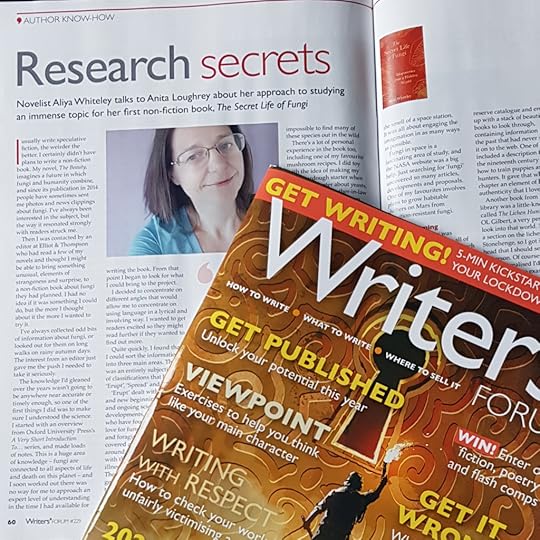
There’ll be more articles and interviews coming up as the publication of Skyward Inn (end of March) approaches, and you can pre-order signed copies from Goldsboro Books now. I’m really pleased with that because I had one of my first big book launches at Goldsboro Books and it was a wonderful event; I’m only sad that I can’t go there and sign for them in person.
And, in the meantime, here’s a link to an interview I did with Library Journal about The Loosening Skin, which will be published in the US shortly. A snippet:
A character states, “Every piece of art made before 2020 is a historical record.” How will COVID-19 change our civilization?
I can only tell you that it’s already changed us and is continuing to change us. On an individual level, we will deal with these emotions, and many more: fear, and grief, and loss. Boredom. Anger. Gratitude. Disbelief. We deal with them, and then they will become part of our collective record of this time, and we will move on. We’re all changing, and we’re all never quite the same again.
January 11, 2021
More Skin
Have an apology: there’s another (slight) delay to the US publication of The Loosening Skin and instead of a publication date of 2nd February it will be available from 23rd February. The US edition has a wonderfully eerie cover by Julia Lloyd, and it includes a new piece of short fiction set in that skin-slipping universe.
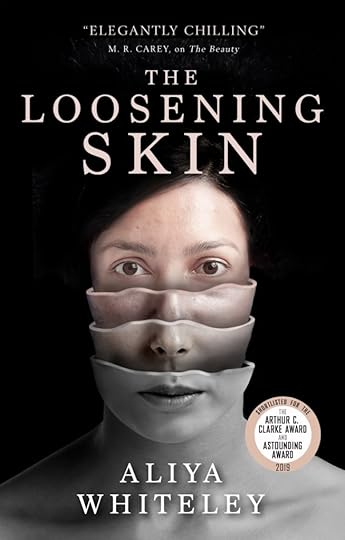
December 28, 2020
Turning the pages in 2020
It’s the last days of the year: the back fence has blown down in Storm Bella, the supply of Christmassy chocolate biscuits is running low, and there’s a huge pile of washing I should be doing. That’s how I know this is the perfect time to sit around in my pyjamas and revisit my reading in 2020.
Wait – I’ve already done that over here, at Fantasy Book Critic. As well as listing some books to look out for next year, James Smythe, M. John Harrison, Rym Kechacha, Marian Womack, Paul Tremblay and others all make an appearance there. Pop over there and look at that list first, maybe.
But I didn’t read all fantasy, and I read some other things since I wrote that post, so I’ll add those here:
I really enjoyed Doris Lessing’s Collected Short Stories, particularly Through The Tunnel, which I’ve never come across before but it seems that its pretty well known, having just googled it. I’m really interested in these pockets of missed knowledge that exist. The blank spots of reading. Anyway. If you’ve got a blank spot about it too, please do go and have a look.
Speaking of blank spots, I have no idea why it took me so long to find out that Saga (Brian K. Vaughan and Fiona Staples) is so good. You’ve all known for ages, probably. I’m glad I found it out during the first lockdown, though, because I read through books one to eight in a fever of escapism. Of course I was going to like it, starting as it does with a love story caused by an underestimated genre novel.
Am I going to mention Richard Brautigan again? Yep, I think he made an appearance in my list last year, and this year I read Sombrero Fallout, A Confederate General From Big Sur, and Revenge of the Lawn and Other Stories. I fell in love with Ernest Hemingway’s Typist, one of those stories, and have read it over and over since. It’s very short, and it makes me feel good.
There something of Brautigan’s timing and humour to Drew Gummerson’s wonderful novel, Seven Nights at the Flamingo Hotel. It’s tragic and comic and rude and earthbound and airborne. I probably identified with it too much, having worked as a waitress and chambermaid in a hotel for years when I was younger. Our hero washes dishes, moves chairs, does all the terrible jobs, and dreams. His dreams are a little more… exotic than mine (I mainly just wanted to stay home and write all day), and they are the stuff of wonder.
The British Library’s Tales of the Weird series continues to entertain me, and this year I found Mortal Echoes (Ed. Greg Buzwell) in the library, waiting for me. Two stories really stood out for me: Donald Barthelme’s The School, and a magnificently creepy piece of work by May Sinclair called Where Their Fire is Not Quenched. I later found out Sinclair wrote many novels and short stories (as well as leading an incredible life – go look her up) and I’m going to try to check some of those out in 2021.
I didn’t read a lot of non-fiction this year – apart from endlessly looking at the news which is a habit I hope I can break in 2021 – but I did surprise myself by tackling a few really challenging, and superb, books in Emmanuel Carrere’s The Adversary and War’s Unwomanly Face by Svetlana Alexievich. I’m glad I did, even though they tackle very difficult subject matters. Perhaps because of that. I also loved Ken Krimstein’s illustrated biography, inhabiting a space between graphic novel and primer: The Three Escapes of Hannah Arendt.
At the other end of the spectrum of illustration, there’s Junji Ito’s Uzumaki. Spirals everywhere. Brilliant body horror. There’s something really satisfying about it as a book. Whenever I open it, there the spirals are. I’ve never seen the film version; I will hopefully watch that next year.
Actually, looking back on it, it was a brilliant reading year. How strange, to only come to that conclusion when summing it up. I could go on listing them, and appreciating them, until the new year but I think I’ll leave it there without getting into things I reread or favourite authors I revisited. Instead I’ll end by saying that I’m grateful for them and their voices, and for the new ones waiting for me on my shelves from my Christmas haul, including books by Patrick McGrath, Jenni Fagan, Yoko Ogawa, and the monster that is Ursula Le Guin’s collected novellas.
Here goes. See you in there.



